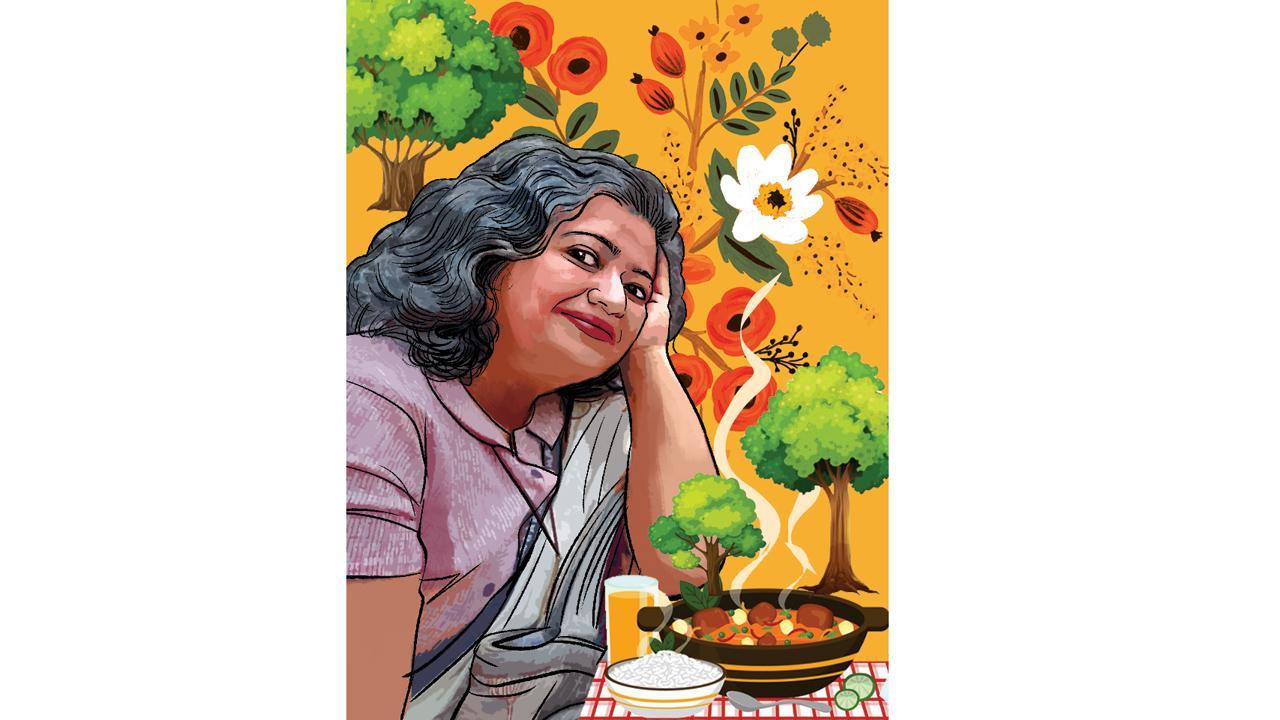Surekha loved trees, nosepins, cooking, Peter Pan collars, poetry, her daughter, fried fish and beef roast, Miyazaki, music, masti and people. She shared this love extravagantly and made people a part of its enjoyment

Illustration/Uday Mohite
I only ever made one friend from Twitter. Her name was Surekha. Her Twitter handle was also @surekha. That’s a story.
ADVERTISEMENT
Two days ago, Surekha died of Covid-19. Hundreds of us expressed our grief and loss online. A young colleague messaged me, “Where can I read more about Surekha? I don’t know who she was but from all the mentions I’m seeing she seems to be someone who touched many hearts in a profound way.” A friend DM’d, “I always meant to ask you what she did”.
What did Surekha do? Well, be Surekha.
Surekha loved trees, nosepins, cooking, Peter Pan collars, poetry, her daughter, fried fish and beef roast, Miyazaki, music, masti and people. She shared this love extravagantly and made people a part of its enjoyment. She shared people’s art and writing fulsomely. She shared hugs online, which seemed weirdly meaningful—because they were meant. She accompanied Priya Ramani to every hearing in her MeToo case—and helped us be part of it with her tweets. She pretended to be the mother of a boy she met during the anti-CAA protests to prevent him being arrested, dressed in a funny winter cap, and did it again. She tweeted from the bus of protestors detained at Lal Qila, and from Shaheen Bagh and helped us partake of the intimacies, love and vulnerability that make political spaces sustaining and beautiful. Perhaps she found it for herself, but she also drew others in with her. One day, she called me and said: “Can you send me a book from your personal collection for the Jamia Pavement Library? I want something of yours to be there.” I sent my favourite book and felt suffused with the love of being part of a larger whole. Every time I was likely to meet a friend of hers, she would demand we send a selfie. We did and felt warmed by love—you can see it in our smiles. No one love was less than another, political or personal.
As my friendship with Surekha grew, we argued, disagreed, judged and encouraged each other—“want one kick? Shy kai! Share your work!” she scolded me. I knew she battled her own set of challenges, her own deep woundedness. I also saw her heal herself bit by bit by constantly expanding her circle of love and renewing her political understandings, asking for generosity as much as giving it.
Once I joked “at least you love me if no one else does.” She said, “My love is equal to hundred times others’ love ok?”
What is love? Perhaps it is to see the essence of others and give them what they need—to someone a hug, to someone advice, to another shared fun. But perhaps it is mostly the painful courage to be yourself, to live as if you are loved, flaws, missteps, bad jokes and all, even if you struggle with that belief, as who does not. And to embody, with that, the belief in people’s capacity to love you, to receive that love even when it comes in disguise, or in uncertain modes. To craft a world with those precarious things, love and connection, and make people long to be that way. To multiply the love a hundred times.
Love was indeed her enterprise. And so, to answer my colleague, Surekha was famous for being Surekha.
Paromita Vohra is an award-winning Mumbai-based filmmaker, writer and curator working with fiction and non-fiction. Reach her at paromita.vohra@mid-day.com
 Subscribe today by clicking the link and stay updated with the latest news!" Click here!
Subscribe today by clicking the link and stay updated with the latest news!" Click here!






